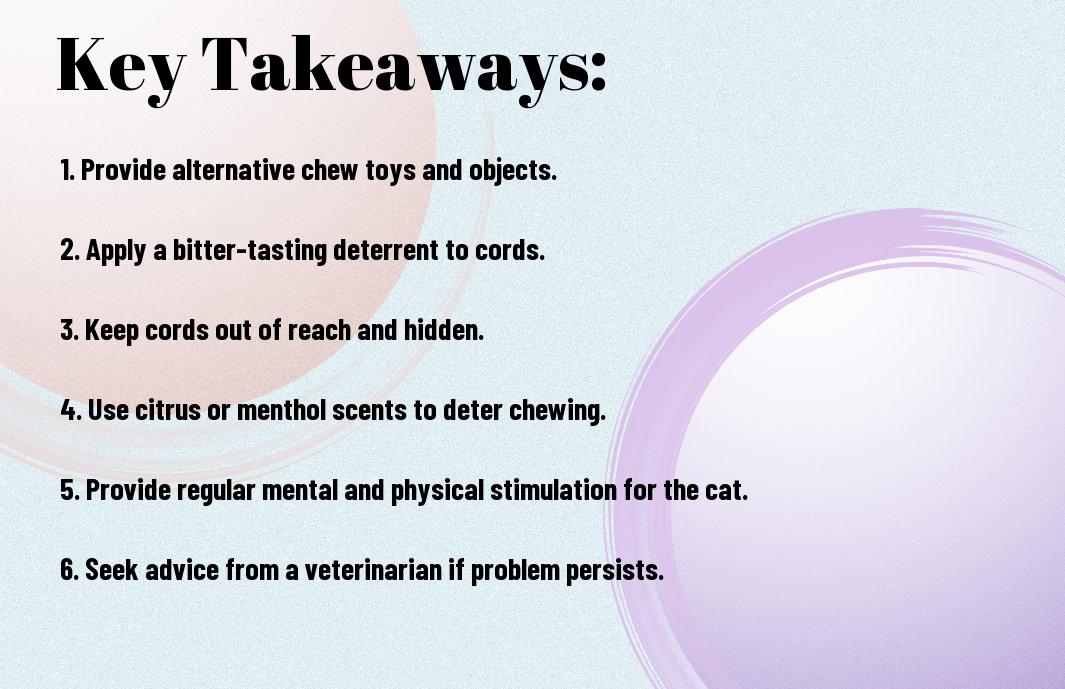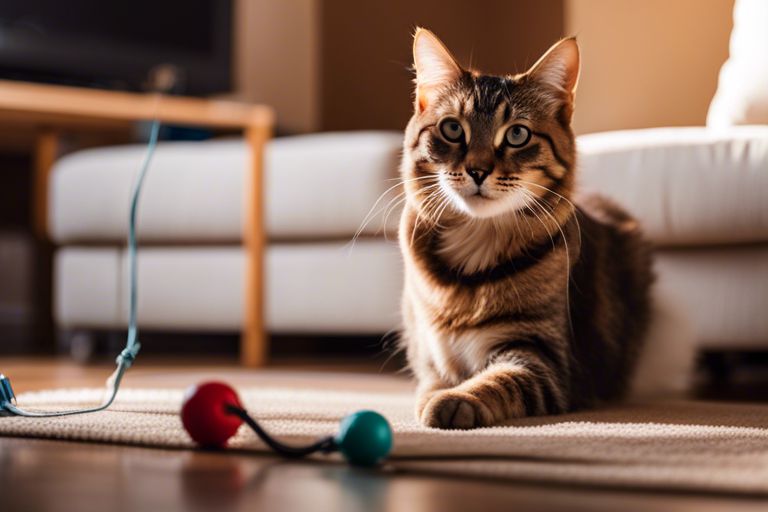Excoriate your feline friend’s insidious behavior of gnawing on your electrical cords. This habit can not only damage your expensive electronics, but also poses a serious risk of electric shock and even death to your beloved pet. Fortunately, there are several effective strategies for deterring your cat from this perilous activity. In this blog post, we will discuss some proven methods for keeping your cords and your cat safe.
Key Takeaways:
- Provide appropriate chewing alternatives: Offer your cat safe and acceptable alternatives to chew on, such as cat-friendly chew toys or dental treats to redirect their chewing behavior away from cords.
- Use deterrents: Apply bitter-tasting sprays or citrus-based deterrents on the cords to discourage your cat from chewing on them. This can help to make the cords unappealing to your cat.
- Supervise and redirect: If you catch your cat in the act of chewing on cords, calmly redirect their attention to a more appropriate activity and provide positive reinforcement when they comply.
- Keep cords out of reach: Use cord covers, cable organizers, or tuck cords behind furniture to physically block your cat’s access to them and minimize the temptation to chew on them.
- Consult a veterinarian or behaviorist: If your cat’s chewing behavior persists despite your efforts, seek professional advice from a veterinarian or animal behaviorist to address any underlying health or behavioral issues.

Prevention Strategies
Obviously, the best way to stop your cat from chewing on cords is to prevent it from happening in the first place. By implementing some simple strategies, you can minimize the risk of your cat being tempted to chew on electrical cords.
Pet-Proofing Electrical Cords
One effective way to prevent your cat from chewing on cords is to pet-proof them. You can do this by using cord protectors or cable covers to encase the cords. These protective covers are usually made of plastic or rubber and can deter your cat from accessing the cords. Additionally, you can use cord shorteners to tidy up excess cord length and keep them out of your cat’s reach.
Providing Alternative Chew Toys
Another prevention strategy is to provide your cat with alternative chewing options. You can offer toys specifically designed for cats to chew on, such as dental toys or chew sticks. By providing a variety of enticing chew toys, you can redirect your cat’s chewing behavior towards safe and appropriate objects, minimizing the risk of them targeting electrical cords.

Behavioral Training Techniques
Now that you understand the reasons behind your cat’s chewing behavior, it’s important to implement some behavioral training techniques to help stop this habit. By using positive reinforcement and deterrents, you can help redirect your cat’s attention away from cords and prevent potential dangers.
Redirection and Positive Reinforcement
One effective strategy for getting your cat to stop chewing on cords is to redirect their behavior to more appropriate items. Providing your cat with designated chew toys and regularly engaging in interactive playtime can help satisfy their natural urge to chew and play. Additionally, whenever you catch your cat showing interest in cords, quickly redirect their attention to the designated chew toys and praise them for using these items instead. Consistent positive reinforcement will help reinforce the idea that chewing on cords is not acceptable behavior.
Using Deterrents to Discourage Chewing
If your cat continues to show interest in cords despite redirection and positive reinforcement, you may need to use deterrents to discourage this behavior. There are various deterrents available, such as bitter-tasting sprays, citrus-scented solutions, or motion-activated devices that emit a harmless but unpleasant noise when your cat gets close to the cords. You can apply these deterrents to the cords or place them near the areas where your cat tends to chew. The unpleasant taste or smell, coupled with the unexpected noise, can help deter your cat from chewing on cords and encourage them to seek out more appropriate items for play.

Creating a Stimulating Environment
Despite your best efforts to hide cords, sometimes it’s simply not possible to keep them out of your cat’s reach. This is where creating a stimulating environment for your cat can help redirect their attention away from the cords and onto more appropriate outlets for their energy and curiosity.
The Role of Environmental Enrichment
Environmental enrichment is the process of providing a stimulating and engaging environment for your cat. This can include items such as climbing trees, scratching posts, and interactive toys. By providing these outlets for your cat’s natural behaviors, you can help reduce their desire to chew on cords out of boredom or frustration.
Regular Playtime and Attention
Regular playtime and attention are crucial for keeping your cat mentally and physically stimulated. By engaging in interactive play sessions with your cat on a daily basis, you can help satisfy their natural hunting instincts and provide an outlet for their energy. Additionally, giving your cat plenty of attention and affection can help decrease any anxiety or boredom that may lead to destructive behaviors like cord chewing.
By incorporating environmental enrichment and regular playtime and attention into your cat’s routine, you can provide them with alternative outlets for their energy and curiosity. This not only helps address the cord chewing behavior, but also promotes your cat’s overall well-being. Remember, keeping your cat mentally and physically stimulated is essential for preventing unwanted behaviors.
Professional Intervention
Your efforts to stop your cat from chewing on cords may not always be successful, and in some cases, professional intervention may be necessary. There are a few avenues of professional intervention you can explore to address this issue. For more detailed information on dealing with this problem, check out Eight Ways How to Get Cats to Stop Chewing on Cords from A-Z Animals.
Consulting a Veterinarian
If your cat’s cord-chewing behavior is causing significant concern or if you suspect a medical issue may be contributing to this behavior, it’s important to consult with a veterinarian. Chewing on cords can pose serious risks to your cat’s health, so it’s crucial to rule out any underlying medical conditions that may be causing this behavior. Your veterinarian can perform a thorough physical examination and may also recommend further tests or assessments to determine the root cause of the behavior.
Seeking Help from an Animal Behaviorist
If your cat’s cord-chewing habit persists despite your best efforts, seeking the expertise of an animal behaviorist may be beneficial. An animal behaviorist can help you understand the underlying reasons for your cat’s behavior and develop a tailored behavior modification plan to address it. They can also provide guidance on implementing environmental enrichment and management strategies to discourage cord chewing and promote more appropriate forms of behavior.
Conclusion
With these considerations in mind, you have several strategies at your disposal for getting your cat to stop chewing on cords. Implementing deterrents such as bitter sprays or covering cords with protective sleeves can help discourage this behavior. Providing your cat with alternative outlets for their chewing needs, such as toys or treats, can also redirect their attention away from cords. Remember to also create a safe and enriching environment for your cat, with plenty of mental and physical stimulation, to help curb their chewing behavior. By combining these strategies, you can effectively train your cat to leave cords alone and keep them safe from harm.
FAQ
Q: Why does my cat chew on cords?
A: Cats may chew on cords for a variety of reasons, including teething, boredom, or a need for stimulation. It could also be a sign of a nutritional deficiency or dental issues. It’s important to address this behavior promptly to prevent potential dangers and damage.
Q: What are some strategies for getting a cat to stop chewing on cords?
A: To deter your cat from chewing on cords, provide them with appropriate chew toys and interactive playtime to keep them mentally and physically stimulated. Additionally, you can use bitter apple spray or citrus-scented deterrents on the cords to make them unappealing to your cat. Keeping cords out of sight or using cord protectors can also help prevent access to tempting items.
Q: Is it important to seek veterinary advice for a cat that chews on cords?
A: Yes, it’s crucial to consult with a veterinarian if your cat continues to chew on cords despite your efforts to deter the behavior. Chewing on cords can pose significant health risks to your cat, including electrical burns or ingestion of toxic materials. Your vet can assess any underlying health issues and provide guidance on behavior modification techniques.

Jayley, a devoted cat enthusiast, also writer for other cat blog as well. She aims to dedicated to providing comprehensive information, insights, and advice on everything you’d ever want to know about our whiskered companions.
